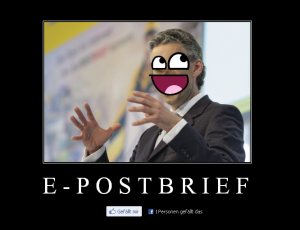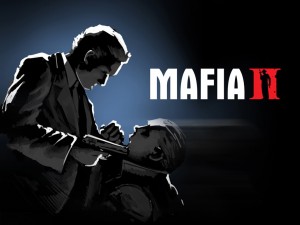 We all know what an email is, right? Germans had the great idea of
reinventing the wheel, once again. In particular I want to talk about the "E-Postbrief" which is a new service by Deutsche Post AG.
We all know what an email is, right? Germans had the great idea of
reinventing the wheel, once again. In particular I want to talk about the "E-Postbrief" which is a new service by Deutsche Post AG.
First of all, what's "E-Postbrief" supposed to mean? The "E" stands for electronic,
just like when talking about conventional emails. I was wondering how to translate "Postbrief" so
I consulted a dictionary to help me out:
E = electronic
Post = mail
Brief =
letter
So, that would make it "electronic mail letter". Awesome.
Now, what's the difference between a conventional email and this new E-Postbrief? You can send usual letters with it, either completely electronic (should your second party also use E-Postbrief) or have them printed and sent as a normal, written letter. Both options cost a minimum of 0,55€ though. Also the electronic delivery is limited to a size of max. 20MB. The idea is to have an email with legal ground, which is legally binding, so you can get doctor's bills, etc. via E-Postbrief and save them digitally instead of having to deal with printed letters.
My first thought: Hell no, I'm not going to pay 0,55€ for each mail. But really, that's still
the least of my concerns with this service.
Because what I didn't mention so far: the service is
supposed to be secure and encrypted!
And how does that work? Well, not with your own public and private keys like PGP or GPG, that's for
sure. Instead, it's made simple for the average citizen. That is: Deutsche Post AG is doing all the work
for you. They encrypt and decrypt everything for you. Anybody else noticing this weird smell?
In case
you're at least wondering what encryption algorithms they're using, well, you won't know. Because they're not
telling.
Security through
obscurity. Except that this pretty much equals having no security at all.
Also they claim that it's "not possible" for Deutsche Post employees to read any E-Postbrief saved in your account. The second sentence corrects that down in a way though by saying it's secured against access by "unauthorized" people. Who is authorized?
In case you're still not convinced that this is some utter insecure crap, by accepting the terms of services you agree
that Deutsche Post may forward your mails (unencrypted!) to law enforcement agencies in case public security
is being endangered. (aka terrori- ohshit, I'm scared.) (9. 9(3))
Did I mention
your emails are mirrored and not deleted once you delete them? Yes, that's right, they'll only be
deleted after an unspecified period of time. You may not see them anymore in your inbox but they're
still there. That's of course just because you might delete something by accident. (2. 2(5))
Because of all the criticism, Deutsche Post added a service so you can generate your own private key and a signature. Funny though: they claim this key is only accessible to you, but who guarantees that? The key is generated on their servers, you simply download it from them. The only way to have a real secure private key is by generating it on your own machine, not anywhere else.
I only raise one question: When they reserve the right to forward mails to law enforcement agencies in an unencrypted format, how is it not possible for any employee to read mails? They have the ability to decrypt them, they have the ability to forward them, but they don't have the ability to read them? Blind employees, the security concept of the future. Germany's always one step ahead.
So, to recap these awesome features of E-Postbrief: Costs money, insecure, totally unnecessary, insecure, did I mention insecure already?
Leave it, don't use it, is my suggestion. Stick to GPG/PGP and once again: Stay private.
 Are you familiar with the "LOLWUT" moment? Yes? No? Well,
let me present you two ridiculous examples.
Are you familiar with the "LOLWUT" moment? Yes? No? Well,
let me present you two ridiculous examples.
You may or may not be familiar with ICQ, an instant messaging service originally developed by
Mirabilis in Israel, later on bought by AOL and just recently
sold to Digital Sky Technologies, a
Russian investment company which also holds shares on the popular Russian mail service mail.ru and even Facebook. ICQ is not
that popular in the U.S. or the U.K. but it's still widely used in Germany (ironic much?) and Russia.
So, let's get started with the hypocrisy. Who cares who owns ICQ? Why would you care in case you're using it? For instance, take this portion of the ICQ Terms of Service which you have to agree to when using the service and registering an ICQ account:
"You agree that by posting any material or information anywhere on the ICQ Services and Information you surrender your copyright and any other proprietary right in the posted material or information. You further agree that ICQ LLC. is entitled to use at its own discretion any of the posted material or information in any manner it deems fit, including, but not limited to, publishing the material or distributing it." - ICQ Terms of Service
Yay, let's have some intimate and private chats. Wait, what? This could already be our
"LOLWUT" moment but trust me, wait for it, it's getting better.
The U.S. government is concerned
about the sale of ICQ to Russian investment company Digital Sky Technologies, guess why? Because now
they can't eavesdrop on ICQ conversations that easily anymore. LOLWUT?!
Of course (!!), that's only for your security. Since they're trying to catch criminals and
"terrorists" this way. Sure. And Santa gets you presents on Christmas Eve.
The hypocritical
part about this is what analyst Jeffrey Carr has to say:
"The move would also be a boon to Russia's powerful secret service, the FSB, says security analyst Jeffrey Carr. Russian law will require ICQ to open its logs when the spooks come knocking, notes Carr, so "if you're on ICQ, and you work for an employer who may be of interest to the FSB, now would be a really good time to close your account"." - NewScientist
U.S. secret service spying on you? Yeah, why not? Nothing bad about it, they're your friends. Any other secret service? No way. BAD, BAD, BAD. Side note: You can't close or terminate your ICQ account.
Now onto my other example, also in the name of security.
You may have read about the United Arab
Emirates wanting to ban BlackBerry Messaging within their country. Why would they want that? Because the U.S. and Israeli governments
may use it to spy on the UAE and therefore it compromises "national security" (I can't
hear it anymore).
The interesting part about BlackBerry Messaging is that it uses an encryption
supposed to stop people from eavesdropping on your conversations. All messages are routed encrypted through
Canadian servers of Research in Motion (RIM),
the developer of BlackBerry.
So basically governments can't eavesdrop on your conversations which,
of course, as a result compromises "national security" and that's why RIM, has two options:
Either hand the encryption codes to the UAE government or face a ban on BlackBerry Messaging. That's the
basic idea. Wow. But again, wait for it.
UAE's Telecommunications Regulatory Authority (TRA) set a deadline to
October 11, 2010 for RIM to hand out the codes.
On October 8, 2010 UAE's TRA released a notice
stating that:
"The Telecommunications Regulatory Authority (TRA) has confirmed that Blackberry services are now compliant with the UAE's telecommunications regulatory framework." - TRA announcement
What does this mean? Did RIM hand out the codes? We can only assume, but check this out:
"The company has, in fact, already provided unencryption codes to officials in the U.S. and Great Britain." - NASDAQ article
LOLWUT?!
And once again we're having the same hypocrisy: U.S. government eavesdropping? Sure thing. Any other
government? No way.
Excuse me, but I don't want any government to eavesdrop on my conversations
just because they're stuck up about "national security". Please, grow up.
So, in the name of your privacy, please use securer and open instant messaging services like Jabber/XMPP combined with GPG/PGP and/or OTR. Or even IRC combined with FiSH. Discuss without the fear of being eavesdropped. Stay private.
Update: Read an update of this article here.
 This is something the whole entertainment industry should take a look
at and think about. I could provide lots of examples now why the honest customer is always the fool and why
'pirates', getting stuff for free benefit, but I'm gonna stick to a more recent game, one where
I experienced myself again why being honest makes you regret every time.
This is something the whole entertainment industry should take a look
at and think about. I could provide lots of examples now why the honest customer is always the fool and why
'pirates', getting stuff for free benefit, but I'm gonna stick to a more recent game, one where
I experienced myself again why being honest makes you regret every time.
I'm going to talk about Mafia 2, the collector's edition of said game to be exact.
The first thing to mention about Mafia 2 is the release date: it was released in North America on 24th August 2010. European countries got it three days later, on 27th August 2010.
First question arises: why? Oh I see, you want to give North American crackers the game so Europeans
don't need to buy it but instead can download a cracked version straight from North America. But no,
nobody would do that, since we're all honest customers and want to pay for entertainment we enjoy.
Actually though, exactly that happened.
Now, I myself wanted to get the PC collector's edition of
Mafia 2. I'm living in Germany and therefore usually import my games from the United Kingdom to avoid
the pain in the ass called censorship, which publishers tend to do a lot here. In this case the German
version of Mafia 2 isn't censored, so it doesn't really matter where I get the game from. However,
turns out that there is not going to be a Mafia 2 PC collector's edition in the United Kingdom, only for
Xbox 360 and PS3.
Second question arises: why? (déjà vu)
But whatever... What about Germany? They're going to have a collector's edition for the PC, but
only limited to one consumer electronics market: Saturn, since they made a special deal with Take 2, the
publisher of Mafia 2. This limitation only affects the PC version, Xbox 360 and PS3 collector's editions
will be sold in every other shop.
Third question arises: why? (...)
So, the honest customer goes to his local Saturn market on 27th August 2010 to pick up a Mafia 2 PC
collector's edition, and guess what? It's sold out!
Fourth question arises: why the fuck should
I even bother buying games?
There you go. I asked four questions and can't answer a single one of them.
 We've all been hearing things about how PC gaming will eventually
die, or in fact, is already dead.
We've all been hearing things about how PC gaming will eventually
die, or in fact, is already dead.
There's one fellow who is pretty certain of this: Michael Pachter. You might be wondering who the hell Michael Pachter is, in case you're not familiar with GameTrailers and his show Pach-Attack! there. Viewers can ask questions to Mr. Pachter who'll answer them with his "expertise".
So, how can he be so sure about what he says? Does he know things we don't? Apparently. He's a "video game analyst" after all, he must know what he's talking about. Or does he? Let's take a look.
The first reason why PC gaming will eventually die of course is because of all these bad pirates who don't want to pay for their games and eventually download them for free. That's also why Mr. Pachter justifies Ubisoft's DRM protection which requires you to be online at all times while playing a game (so far used by Silent Hunter 5, Assassin's Creed 2, Splinter Cell Conviction and Prince of Persia The Forgotten Sands).
"I wish all games were like that because I think people who steal should be in jail." - Michael Pachter
And I think you want people's money, so don't give them reasons why they would rather download the game instead of buying it. As Eric Garland said:
"That's how you start to marginalize piracy - not just by using the stick, but by using the carrot." - Eric Garland
But Mr. Pachter doesn't even see problem with these consumer hating protections, the only thing he sees are thieves.
"Authenticating the disc is being valid, that is the most fair thing in the world and everybody who complains - and this is one of the things, what was it? Spore? The game that was on torrent and like 500.000 copies downloaded in a day because people didn't like that you could only put it on - whatever it was - three PCs, five PCs, that's just - I'm sorry flamers - it pisses me off. It's like "I should have a right to steal" and "How dare EA stop my right to steal their property", that blows me away. So, so, yeah, I think you're going to have this online streaming Ubisoft is going to do to stop piracy and it's right." - Michael Pachter
Yes, it was Spore and the reason is pretty simple too. The game is limiting installation to 5 different PCs and requires an online activation. Bear in mind that when you change essential hardware of your current PC, like the mainboard, that's also considered a "different PC" and thus you have to reactivate the game. Most users apparently never actually install the game so often that they run out of licenses, but it's possible, and what happens after you run out? You have to contact EA support and ask them whether they can give you some more. That's a game you paid full price for. Again: a game you paid for. Any limit like this should not occur with a game you paid for, this is not about stealing property off a company, this is about the company treating their customers like shit. So they got what was coming to them: The game was cracked and leaked on the Internet five days before the official North American street date. The controversy about the activation limitation outraged people and thus the game was happily shared.
Also interesting is that pirating games on consoles such as Wii, DS and Xbox 360 is fairly easy to achieve yet nobody even mentions it. Get a modchip or special cartridge, download your games happily and you're good to go. Nintendo is trying to block this on the Wii but they fail miserably. Microsoft is also trying a little but in the end the worst that can happen is a ban on Xbox Live, which costs monthly anyhow.
So, why does Mr. Pachter make such statements? It's rather easy, there is lots of money to be made. This isn't actually about gaming, this is all about making money out of video games and a way to achieve that is selling consoles with paid monthly subscriptions to play games online instead of letting gamers use a PC, where nobody guarantees they're buying exactly the products the manufacturer wants them to.
"A 250GB hard drive costs something like 25 bucks and they're really not expensive." - Michael Pachter
Wait, what? But Microsoft is charging like $128 for a Xbox 360 250GB hard drive. Clearly that must include some additional hardware that justifies the price, yes, there must be something. Oh no wait, there isn't. Microsoft just wants to make lots of money, sorry.
In fact console manufacturers like Microsoft, Sony and Nintendo get money for each game that is being released and sold on their platform. It is clear why everybody proclaims the PC dead, because nobody except the direct developers and publishers of the games get money for them. No PC manufacturer gains money for sold games, they only get money for the hardware gamers buy.
So, the Dollar symbol and intro for Pach-Attack! are quite perfectly fitting in my opinion. If you still think this guy knows what he's talking about:
"Nobody has a PC that's faster than PS3." - Michael Pachter
I rest my case.
